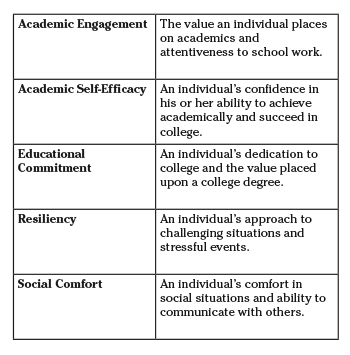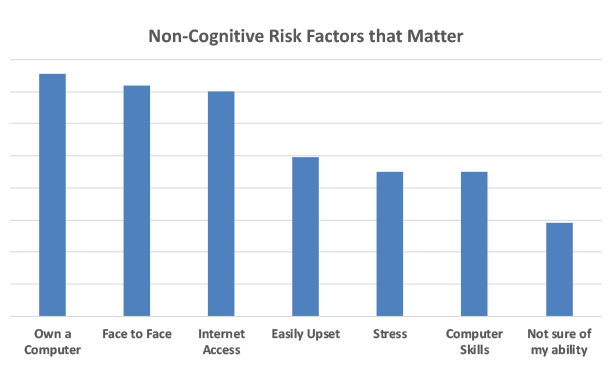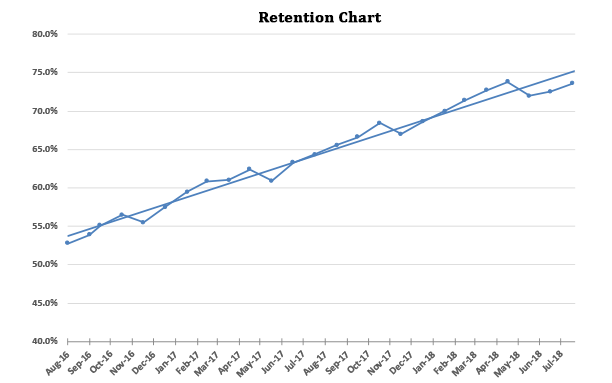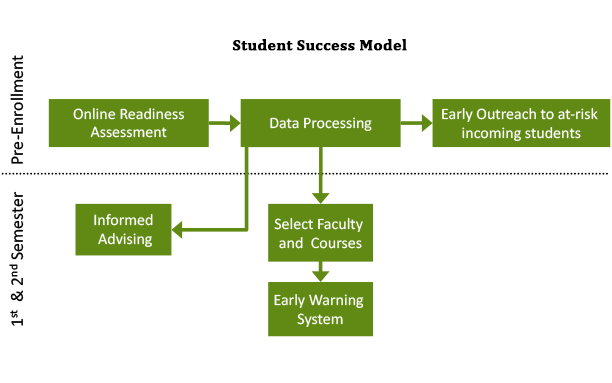
Cognitive and Non-Cognitive Factors to Predict Student Success
By Larry Banks, Ph.D., Academic Dean and Art Waller, Ph.D., Campus Director, Vista College Online
Are your applicants ready to be students? Do you want to improve student retention by 7 to 15 percent? The fact is applicants may have acceptable cognitive scores to be directly admitted into college programs, but they may not be ready to be college students.
Career colleges tend to attract first-generation students, yet within higher education, two-thirds of all first-generation students will not graduate.
To say it another way, if a career school enrolls 100 first-generation students, typically 33-35 will graduate. It is just the opposite with multi-generation students, where 65-70 will graduate. Given the propensity of first-generation students to drop, the question becomes “Is there an assessment that career schools can use to improve the probability of graduation?”
The Accrediting Commission of Career Schools and Colleges (ACCSC) put standards in place that require online schools and distance education programs to establish admissions processes that include an assessment of the student’s technical skills, competencies, and access to technology; all necessary to succeed in a distance education environment. In addition, the assessment tool used needs to discern the student’s capability to benefit from enrolling in the distance education program offered, and the school must demonstrate the validity and reliability of the assessment instrument used to assess a student’s readiness for distance education online learning.
As a result, Vista College Online created and implemented an online readiness assessment instrument based on cognitive and non-cognitive risk factors.
Research suggests that non-cognitive variables are potent predictors of school-based outcomes (e.g., academic performance and persistence), particularly for first-generation students.
Non-cognitive factors refer to motivation, adjustment, behaviors, and attitudes that are distinct from the traditional verbal and quantitative areas measured by ability or achievement tests. Examples: self-efficacy, goals, academic engagement, resiliency, social skills, and educational commitment.
When combined with cognitive measures (GPA, ACT/SAT), non-cognitive factors significantly add to our ability to predict student outcomes. A meta-analysis (Robbins et al., 2004) suggests that there are approximately 10 non-cognitive variables that are strong predictors of student outcomes, that there are different predictors for retention versus performance, and approximately 4 – 6 of these offer significant incremental validity over standardized tests and GPA. Some significant non-cognitive factors for career colleges include:

The following is an example of how Vista College Online assesses applicants for both cognitive and non-cognitive factors. In order to meet ACCSC’s standard for distance education programs, Vista College developed an online student readiness survey to assess the student’s capability to benefit from a distance education program prior to enrollment. The school utilizes the assessment instrument to determine if the student’s learning style is conducive to online learning and to identify other non-cognitive risk factors that may prevent the student from graduating. According to Dr. Banks, “Retention is an effect, not a cause. Students drop for many reasons. With first-generation students, it is particularly important to support them with prompt and frequent confidence building feedback. A non-cognitive assessment identifies risk factors, provides data to mentor students, and information to build relationships and interventions to enhance the probability of student success.”
From the literature on non-cognitive success factors, Vista College developed an assessment instrument that is administered while students complete the Wonderlic SLE, cognitive assessment.
Vista College’s Non-Cognitive Online Readiness Survey
Internet and Comfort with Computers
- Computer skills
- Have a computer
- Have access to the internet
Study Skills
- Ability to work independently
- Need face to face instruction
- Have a good place to study
- Dropped out of a class in the past
Educational Commitment
- I am willing to do whatever it takes to stay in college
- Graduating from college is necessary for me to achieve my career goals
- It is okay to miss deadlines by a day or two
Academic Engagement
- I turn in my homework on time
- I wait until the last minute to get my assignments done
Resiliency
- I manage stress well
- Little things upset me
- I have support to finish my degree
- Not sure of ability to complete degree
Vista College Online is beginning to demonstrate the validity and reliability of the assessment to assess a student’s readiness for distance education online learning, academic progress, and student achievement data.
Like other studies in the first-year success studies, Vista College identified 4-6 non-cognitive factors that matter. As a result, the school is in the process of re-engineering its application process to improve retention.
Vista College Online has improved its retention by using the assessment data to design strategies and tactics that meet the needs of first-generation students. In the past, the school accepted students after they met a specified Wonderlic cognitive score. Now, five or more non-cognitive risk factors triggers a discussion between academics and enrollment. The administration is squarely focused on improving the probability of student graduation. As of today, the online school is retaining more students than the corporation’s ground campuses. Why? Faculty, staff, and administration are connecting with students to build relationships, to provide prompt, confidence building feedback, and to use non-cognitive risk factors to predict the probability of graduation.
While it is easy to admit students based on cognitive scores, it is another thing to develop an assessment and use the data to increase the probability of student success. According to Dr. Waller, “In many ways, we are at the forefront in predicting student success for online programs in the career college space.”
Vista College Online is intentionally developing a data driven student success model. Data is turned into information to mentor students.
First-generation students may lack an appreciation for the value of the degree or confidence to complete a degree, need to feel supported, and need a relationship with their instructors and staff. According to Tinto (1993), “… Students are more likely to persist and graduate in settings that provide academic, social, and personal support, and students are more likely to persist and graduate in settings that provide frequent and early feedback about their performance.” In fact, “The frequency and quality of contact with faculty, staff, and other students is an important independent predictor of student persistence.” Vista College Online meets weekly to review continuing students. Student services, program directors, and administration collaborate and hold each other accountable to connect with students. Faculty, program directors, and administrators use the data to build confidence and relationships.
In today’s career college landscape, it is imperative to be focused on student outcomes. One of the best ways to address this is on the front end of the application process, and early in the student’s college experience – especially if the student is first-generation. Most schools have an admissions test to address the cognitive abilities of prospective students. Within the career college sector, few schools evaluate applicants for non-cognitive risk facts.
Vista College Online has improved its outcome by incorporating a data-driven student success model. Non-cognitive factors are important components of both college and career success. Many non-cognitive variables are malleable and can be supported, developed, and/or remediated. To improve retention career schools could assess for non-cognitive risk factors, use the data to design student success strategies, and deliberately advise first-generation applicants and students to build confidence.
References
Robbins, S., Lauver, K., Le, H., Davis, D., Langley, R., & Carlstrom, A. (2004). Do psychosocial and study skill factors predict college outcomes? A meta-analysis.
Tinto, V. (1993). Leaving college: Rethinking the causes and cures of student attrition. 2nd.ed. Chicago: The University of Chicago.
DR. BANKS is highly experienced at implementing first-generation student retention strategies for ground, blended, and distance education schools. Currently, he is the Academic Dean for Vista Online. He has been Provost at Rocky Mountain University of Health Professions, Associate Provost for Program Development at Western Governors University, and Campus President and VPPA for Argosy University.
Contact Information: Larry Banks, Ph.D.// Online Academic Dean // Vista College Online // 801-792-4325 // lbanks@vistacollege.edu // https://www.vistacollege.edu
DR. WALLER is the Campus Director of Vista College Online and a commissioner for ACCSC, serving on the executive committee as Treasurer. Most recently he was the Vice President/Director for Independence University and prior to that he was the Regional Department Head/Executive Director of the Wasatch Front/Southwest Regions for Utah State University. Dr. Waller has Ph.D. in Education (C&I with emphasis in teaching and higher education) from Utah State University.
Contact Information: Arthur D. Waller, Ph.D. // Online Campus Director // Vista College // 972-707-8600 x2004 // awaller@vistacollege.edu // https://www.vistacollege.edu















